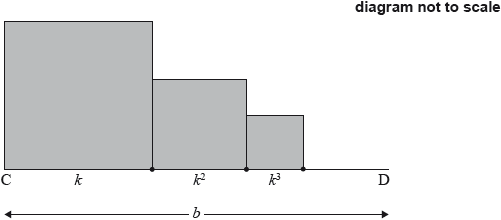| Date | November 2017 | Marks available | 5 | Reference code | 17N.1.sl.TZ0.10 |
| Level | SL only | Paper | 1 | Time zone | TZ0 |
| Command term | Show that | Question number | 10 | Adapted from | N/A |
Question
The following diagram shows [AB], with length 2 cm. The line is divided into an infinite number of line segments. The diagram shows the first three segments.

The length of the line segments are \(p{\text{ cm}},{\text{ }}{p^2}{\text{ cm}},{\text{ }}{p^3}{\text{ cm}},{\text{ }} \ldots \), where \(0 < p < 1\).
Show that \(p = \frac{2}{3}\).
The following diagram shows [CD], with length \(b{\text{ cm}}\), where \(b > 1\). Squares with side lengths \(k{\text{ cm}},{\text{ }}{k^2}{\text{ cm}},{\text{ }}{k^3}{\text{ cm}},{\text{ }} \ldots \), where \(0 < k < 1\), are drawn along [CD]. This process is carried on indefinitely. The diagram shows the first three squares.

The total sum of the areas of all the squares is \(\frac{9}{{16}}\). Find the value of \(b\).
Markscheme
infinite sum of segments is 2 (seen anywhere) (A1)
eg\(\,\,\,\,\,\)\(p + {p^2} + {p^3} + \ldots = 2,{\text{ }}\frac{{{u_1}}}{{1 - r}} = 2\)
recognizing GP (M1)
eg\(\,\,\,\,\,\)ratio is \(p,{\text{ }}\frac{{{u_1}}}{{1 - r}},{\text{ }}{u_n} = {u_1} \times {r^{n - 1}},{\text{ }}\frac{{{u_1}({r^n} - 1)}}{{r - 1}}\)
correct substitution into \({S_\infty }\) formula (may be seen in equation) A1
eg\(\,\,\,\,\,\)\(\frac{p}{{1 - p}}\)
correct equation (A1)
eg\(\,\,\,\,\,\)\(\frac{p}{{1 - p}} = 2,{\text{ }}p = 2 - 2p\)
correct working leading to answer A1
eg\(\,\,\,\,\,\)\(3p = 2,{\text{ }}2 - 3p = 0\)
\(p = \frac{2}{3}{\text{ (cm)}}\) AG N0
[5 marks]
recognizing infinite geometric series with squares (M1)
eg\(\,\,\,\,\,\)\({k^2} + {k^4} + {k^6} + \ldots ,{\text{ }}\frac{{{k^2}}}{{1 - {k^2}}}\)
correct substitution into \({S_\infty } = \frac{9}{{16}}\) (must substitute into formula) (A2)
eg\(\,\,\,\,\,\)\(\frac{{{k^2}}}{{1 - {k^2}}} = \frac{9}{{16}}\)
correct working (A1)
eg\(\,\,\,\,\,\)\(16{k^2} = 9 - 9{k^2},{\text{ }}25{k^2} = 9,{\text{ }}{k^2} = \frac{9}{{25}}\)
\(k = \frac{3}{5}\) (seen anywhere) A1
valid approach with segments and CD (may be seen earlier) (M1)
eg\(\,\,\,\,\,\)\(r = k,{\text{ }}{S_\infty } = b\)
correct expression for \(b\) in terms of \(k\) (may be seen earlier) (A1)
eg\(\,\,\,\,\,\)\(b = \frac{k}{{1 - k}},{\text{ }}b = \sum\limits_{n = 1}^\infty {{k^n},{\text{ }}b = k + {k^2} + {k^3} + \ldots } \)
substituting their value of \(k\) into their formula for \(b\) (M1)
eg\(\,\,\,\,\,\)\(\frac{{\frac{3}{5}}}{{1 - \frac{3}{5}}},{\text{ }}\frac{{\left( {\frac{3}{5}} \right)}}{{\left( {\frac{2}{5}} \right)}}\)
\(b = \frac{3}{2}\) A1 N3
[9 marks]

